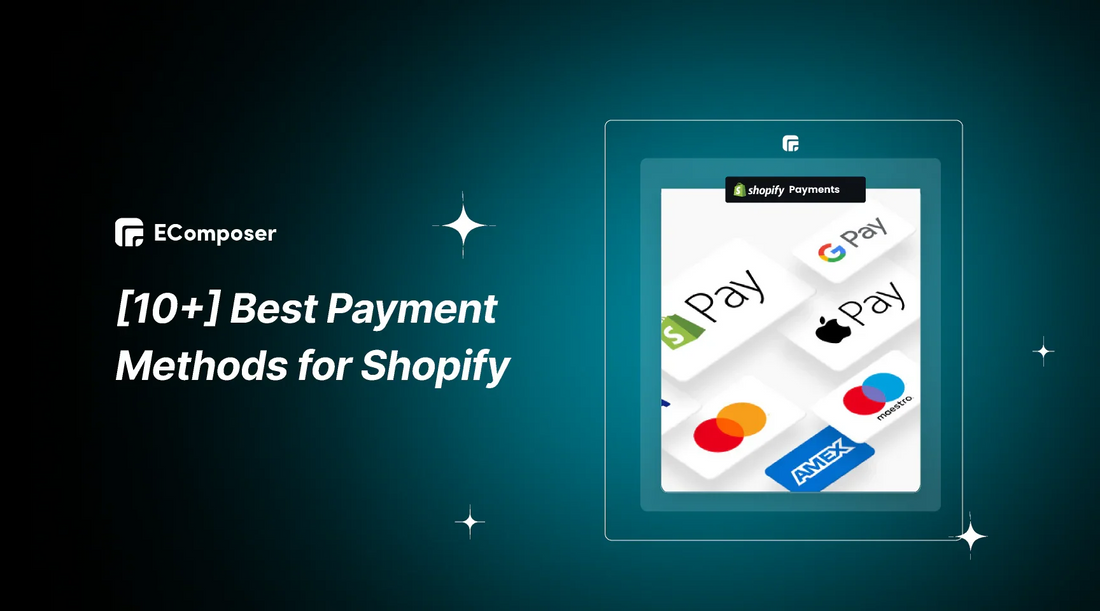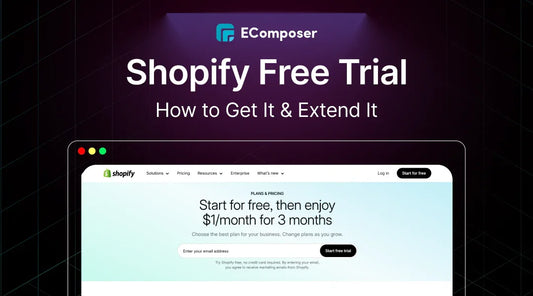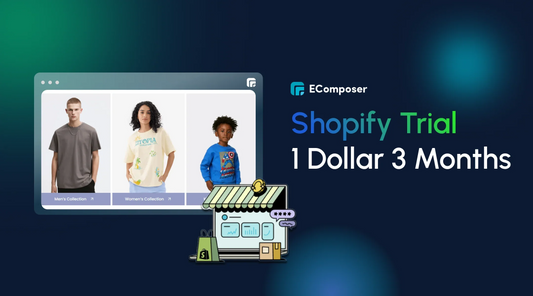10+ Best Payment Gateways for your Shopify stores in 2025

Table Of Contents
In the ever changing world of online shopping, choosing the best payment options for your Shopify business is crucial. With over 10 payment options available, navigating through them can be overwhelming. However, choosing the optimal payment methods can significantly impact your sales and customer satisfaction.
Did you know that the absence of payment options causes 9% of online consumers to give up on their carts? In this comprehensive guide, we delve into the [10+] best payment methods for Shopify, providing insights and strategies to enhance your online transactions and ultimately drive success for your business.
What payment options does Shopify offer?

A payment solution encompasses any service, platform, or mechanism designed to facilitate the exchange of money between individuals, businesses, or entities. Utilizing diverse technologies, it enables the initiation, processing, and completion of financial transactions, spanning from digital payments to traditional cash exchanges.
For proprietors in the retail sector, payment solutions represent the avenues through which they can receive payments from their clientele. In the context of e-commerce, this usually relates to how credit and debit card transactions are handled. Nonetheless, online consumers are progressively adopting alternative payment methods such as Amazon Pay, Apple Pay, Google Pay, and deferred payment options.
How do payment solutions function?

The three essential components of a payment system are a merchant account, a payment processor, and a payment gateway. Let's now examine each:
1. Merchant accounts
When a business seeks to accept electronic payments, it commonly establishes a specialized bank account known as a merchant account. This account facilitates the receipt of payments from customers through diverse methods such as credit cards, debit cards, and near-field communication (NFC) mobile payments. Upon a customer's purchase, funds are deducted from their financial institution and transferred into this designated merchant account.
2. Payment gateways
A payment gateway functions as the secure technology responsible for authorizing and managing transactions between customers and merchants. It employs encryption to safeguard sensitive data, such as credit card details, during transmission, ensuring heightened security. After a customer completes an online purchase, the payment gateway gets their payment information and forwards it to a payment processor for further
3. Payment processors
A payment processor serves as a mediator among the merchant, the customer, and the financial entities engaged in the transaction process. Its primary role is to ensure the authorization for the transfer of funds from the customer's account to the merchant's merchant account. Should there be insufficient funds or a rejection by the bank, the payment processor terminates the transaction.
A payment service provider (PSP) is a subtype of payment processor that extends supplementary services like fraud detection and currency conversion. Numerous PSPs also furnish reporting utilities and analytical features, aiding businesses in monitoring sales, inventory management, and gaining valuable insights into their operational dynamics.
4. The payment solution collaborates
Here's how the triad of components in the payment solution collaborates to finalize a payment:
- Customer initiates payment: When a consumer decides to make a purchase, they choose their preferred payment method, such PayPal or a credit card.
- Initial transaction processing: Secure transmission of payment information occurs via the payment gateway to the payment processor or acquiring bank.
- Authorization and authentication: The payment processor validates transaction details, verifies fund availability or credit, and forwards the request to the customer's bank (issuing bank) for approval.
- Approval or decline: The issuing bank assesses the transaction and either approves or rejects it, communicating the response back via the same channels.
- Completion of the payment process: The payment processor notifies the payment gateway, which in turn notifies the merchant, after receiving approval from the issuing bank. The customer's account is debited, and funds are transferred to the merchant's account, culminating the transaction.
Top 10 Shopify Payment Methods to Choose
|
Payment Method |
Transaction Fees |
Ease of Use and Integration |
Security & Fraud Protection |
Supported Countries |
|
Shopify Payments |
Standard 2.2% transaction fee (Varies by plan and country) |
Seamless integration with Shopify |
High level of security, built-in fraud analysis |
Available in select countries |
|
Stripe |
2.9% + $0.30 per transaction (may vary by country) |
Easy integration with Shopify |
Advanced fraud detection and security features |
Available in 46 countries |
|
Square |
2.9% + $0.30 per transaction |
Easy integration with Shopify |
PCI-compliant, fraud detection, & encryption |
Available in the United States, Canada, Japan, Australia, & the UK |
|
Paypal |
2.9% + $0.30 per transaction (may vary by country |
Easy integration with Shopify |
Strong security measures, seller & buyer protection |
Available in over 200 countries |
|
Braintree |
2.9% + $0.30 per transaction (may vary) |
Moderate to High |
High with automated fraud detection and secure customer management system |
Available in 40+ countries |
|
Apple Pay |
No charge |
High with seamless integration into Apple devices |
High with tokenization and biometric authentication |
Available in 60+ countries |
|
Google Pay |
No charge |
High with convenient payment method for Android users |
High with NFC technology for secure transactions |
Varies |
|
Amazon Pay |
2.9% + $0.30 per transaction (may vary by country) |
Simple integration with Shopify |
Advanced fraud protection, A-to-z Guarantee |
Available in select countries |
|
Authorize.Net |
2.9% + $0.30 per transaction (may vary by country) |
Moderate to High with seamless integration with Shopify |
High with automated fraud detection and card tokenization |
Available in 33+ countries |
|
2Checkout |
3.5% + $0.35 per transaction (may vary by country) |
Moderate to High with specialized in online sales and subscription billing |
High with reliable customer support and assistance |
Available in 200+ countries |
1. Shopify Payments

To kick off this compilation, let's spotlight Shopify Payments, an in-house payment solution by Shopify.
Shopify Payments encompasses a comprehensive suite of features tailored to streamline payment management on your website, eliminating the need for third-party services. For in-person purchases, this all-inclusive payment solution even provides retailers with a free card reader. The money will normally appear in your bank account three business days later.
Distinctively, Shopify Payments waives the standard 2.2% transaction fee associated with other third-party methods, thereby curbing operational expenses. Moreover, opting for an upgraded Shopify subscription plan entitles you to reduced credit card transaction fees.
Designed for user convenience, Shopify Payments boasts an intuitive interface, ensuring seamless navigation for both merchants and customers alike.
Regarding pricing, setting up Shopify Payments incurs no supplementary charges beyond your standard store subscription fee, card management fees, and associated expenses.
Pros:
- No additional transaction fees
- Real-time monitoring capabilities
- Seamless integration and setup
- Enhanced security features
- Expedited checkout process
- Lower processing fees compared to alternative Shopify payment methods
Cons:
- Limited availability across countries
- Potential temporary withholding of funds by Shopify
2. Stripe

Stripe emerges as another widely embraced payment solution facilitating transactions from both local and international customers. Renowned for its array of features conducive to expansive growth, it particularly caters to large-scale eCommerce enterprises.
Offering functionalities such as invoice generation and recurring subscription setup, Stripe enables seamless sales tracking while maintaining operational costs at a minimum. Furthermore, its dedicated mobile application facilitates these processes on the go.
Stripe operates on a flat-rate pricing model of 2.9% plus $0.30 per transaction, with the option for customized quotes for sizable eCommerce ventures. Instant payouts to bank accounts incur a 1% charge, with an additional 1% levy for international transactions.
Pros:
- Easy setup process
- Transparent flat-rate pricing system
- No setup or cancellation fees
- Support for diverse payment options
- Wide currency and payment method support
- Customizable checkout flow
- Exceptional customer service
Cons:
- Steeper learning curve for some users
- Availability limited to Shopify store owners in approximately 39 countries
3. Square

Next on our roster of dependable Shopify payment solutions is Square, a versatile option catering to both online and brick-and-mortar establishments. Whether you operate an e-commerce platform or a physical store, Square proves to be a steadfast payment avenue.
Square boasts an array of beneficial extensions seamlessly integrable into your Shopify store, alongside a user-friendly dashboard enabling real-time monitoring of transactions, cash flow, and inventory.
This payment solution offers Shopify merchants various payment structures, encompassing donations, membership fees, appointment scheduling fees, and standard transactions. Additionally, the workflow is enhanced with Square Cash App.
Transactions facilitated through Square are fully secured, adhering to PCI compliance standards and employing end-to-end encryption. Expedited payment processing ensures funds are deposited into your bank account within one to two days.
Regarding pricing, Square applies a standard transaction fee of 2.9% plus $0.30 per transaction. For enhanced features, consider the premium plan starting at $12 per month.
Pros:
- Flat-rate pricing model
- Exceptional customer support
Cons:
- Not suited for large-scale businesses
- Possible stability issues with accounts
4. PayPal

PayPal stands as one of the globally renowned payment providers for Shopify, boasting the trust of over 220 million users worldwide. Known for its user-friendly interface, setting up a PayPal account typically takes less than a day.
For Shopify store owners, PayPal presents both free and paid subscription options, each granting access to PayPal's support services and facilitating setup for subscriptions and recurring payments. Transaction fees apply, calculable through PayPal's fee calculator.
With diverse pricing plans available, PayPal's basic package starts at a flat rate of 2.9% plus $0.30 per transaction. Alternatively, the Pro plan, priced at $30 per month, caters to larger-scale enterprises.
Pros:
- Transparent flat-rate pricing
- Support for various currencies
- Intuitive mobile interface
Cons:
- Inconsistent customer service
- Potential account closure without prior notice
5. Braintree

Braintree stands out as another exceptional payment processing gateway for Shopify merchants, it facilitates and authenticates online transactions between customers and merchants. As a subsidiary of PayPal, it inherits the esteemed reputation of its parent company, establishing itself as a prominent payment processor catering to businesses across the spectrum. With its global reach mirroring that of PayPal's, Braintree has emerged as a preferred choice for businesses worldwide.
Transaction fees for Braintree like Paypal, commence at 2.9% plus $0.30 per transaction, ensuring accessibility for businesses of various sizes.
Pros:
- Mobility: Accessible on mobile and desktop, perfect for businesses on the move.
- PayPal Affiliation: Enjoy potential perks like better rates for PayPal transactions.
- Payouts: Simplify payments to employees and contractors, keeping finances organized.
Cons:
- Transaction Fees: Braintree's fees, including foreign transaction and AmEx charges, may vary and impact overall cost.
- ACH Pricing: Braintree's ACH transaction rates may not be as competitive as alternatives.
Besides integrating payment methods into your Shopify Store, prioritizing customer satisfaction and ensuring easy access to products are crucial for a well-rounded website. EComposer stands out as an ideal solution, providing a budget-friendly and streamlined approach to creating an attractive online platform.
As one of the best Shopify Page Builder, it makes the design process easier with its user-friendly drag-and-drop editor and eye-catching templates, making it possible to create engaging landing pages, eye-catching homepages to educational blogs and more.

Creating optimized pages has become more streamlined, with a variety of components and add-ons available. The Landing Page Builder now incorporates advanced features like an AJAX cart, AI content generator, and image compressor, boosting your store's efficiency. This comprehensive solution streamlines processes, saving time, resources, and costs, enabling the rapid development of sophisticated Shopify stores.
Boost your e-commerce endeavors with EComposer—give it a try for free! For those without a Shopify account, take advantage of a special offer: just $1 per month.
6. Apple Pay

Apple Pay stands as a premier payment solution seamlessly integrated into Apple devices, empowering users to conduct secure transactions in stores, apps, and online platforms using their iPhones, Apple Watches, iPads, and Macs. You don't pay any extra fees for accepting Apple Pay.
Through API integration, businesses can effortlessly incorporate Apple Pay into their apps and websites, offering customers a streamlined checkout experience. This feature-rich platform serves as a valuable asset for businesses prioritizing Apple users, enhancing accessibility and convenience for their clientele.
Pros:
- Seamless integration with Apple devices enhances user experience
- Offers enhanced security features, including tokenization and biometric authentication
- Streamlined checkout process leads to higher conversion rates
- Provides access to a large user base of Apple customers
- Simplifies transaction management for businesses
- No additional fees incurred for accepting Apple Pay transactions
Cons:
- Limited support for non-Apple devices
- Requires customers to have compatible Apple devices
- May face additional fees from payment processors for Apple Pay transactions
- Availability may vary by region or country
- Integration may require technical expertise for implementation
7. Google Pay

Google Pay enables users to conveniently make payments in stores, online, and within apps using Android mobile devices. Leveraging NFC technology, it ensures swift and secure transactions, garnering widespread acceptance across various online platforms and retail stores.
Google Pay typically does not charge users or businesses for making or accepting payments. However, merchants may incur standard transaction fees from their payment processors.
Pros:
- Convenient payment method for Android users
- Utilizes NFC technology for quick and secure transactions
- Widely accepted across online platforms and retail stores
- Simplifies checkout process for users
- Offers loyalty program integration and personalized offers
Cons:
- Limited availability on non-Android devices
- Compatibility issues may arise with older Android devices or devices lacking NFC capabilities
- Dependency on internet connectivity for online transactions
- Because user data is collected for transactional purposes, privacy problems may surface.
- Some merchants may incur standard transaction fees from their payment processors
8. Amazon Pay

Amazon Pay emerges as a stellar Shopify payment gateway choice for merchants. Effortless to configure, it enables customers to seamlessly checkout utilizing their Amazon credentials.
Accessible globally, transactions conducted through this method are swift and dependable, supported by Amazon's robust customer service.
With transaction fees commencing at 2.9% plus $0.30 per transaction, Amazon Pay presents an accessible payment solution.
Pros:
- User-friendly interface
- Integration with Amazon's fraud protection system
- Seamless setup and integration with Shopify
- Streamlined checkout process saves customers time and effort
Cons:
- Requires customers to have an Amazon account for payment
- Does not support PayPal payments
- Risk of account suspension for potential violations of Amazon's policies
9. Authorize.Net

Authorize.net stands out as a reliable payment processing gateway seamlessly integrated with Shopify. Notable for its intuitive UI, it provides an abundance of interesting functions.
The platform extends support for online, e-check, and mobile payment processing, accommodating various payment methods such as Visa, JCB, Discover, MasterCard, Diner’s Club, and American Express.
Noteworthy for its stringent security measures, Authorize.net employs automated fraud detection, card tokenization, and a secure customer management system, ensuring utmost protection for transactions.
An optimal choice for Shopify merchants, it also facilitates other digital payment alternatives like Apple Pay.
In terms of pricing, Authorize.net entails a $49 setup fee alongside a transaction fee of 2.9% plus $0.30.
Pros:
- Wide currency and payment option support
- Robust fraud prevention and security features
- Exceptional customer service
Cons:
- Cost may be prohibitive for some merchants
- All-in-one option could be confusing for Shopify store owners
10. 2Checkout

A subsidiary of Verifone, 2Checkout specializes in facilitating online sales and subscription billing. It offers merchants access to global payments across a wide range of financial networks, making it a favored choice among software companies and sellers of digital goods.
2Checkout typically charges a standard transaction fee, which may vary based on factors such as the type of transaction and the region. The most affordable option offered by 2Checkout, known as 2Sell, comes with a fee of 3.5% plus $0.35 per successful sale. This plan is exclusive to Shopify users.
Pros:
- Specializes in online sales and subscription billing
- Enables merchants to accept payments from various financial networks
- Provides strong functionality and an intuitive interface for handling sales and subscriptions.
- Provides reliable customer support and assistance to merchants
- Integrates seamlessly with e-commerce platforms and software applications
Cons:
- Transaction fees may vary and could potentially impact overall costs for merchants
- Certain features or services may incur additional charges
- Limited customization options for checkout pages and payment forms
- Compliance requirements and regulations may vary by region
- Integration and setup processes may require technical expertise
Others also read
- Shopify Partial Payments: A Comprehensive Guide
- How to Test Shopify Credit Card Payments?
- How to activate Shopify Pay Installments
Selecting the most suitable Shopify payment gateway for your online store

As an entrepreneur, you seek a payment solution that enhances customer experience and streamlines transactions, devoid of excessive fees. Take into account the following aspects when choosing a payment provider:
In conclusion, choosing the right Shopify payment gateway is pivotal for ensuring seamless transactions and optimal customer satisfaction in your online store.
FAQs
1. Can my Shopify store accept more than one payment method?
Yes, your Shopify store allows you to accept numerous payment methods. With Shopify, you can provide your customers a variety of payment choices, giving them flexibility and convenience during the checkout process. Multiple payment gateways, including PayPal, Stripe, Shopify Payments, and others, may be integrated to allow clients to pay using their preferred manner.
Additionally, you can customize your store settings to enable specific payment methods based on factors like customer location or order value, ensuring a seamless shopping experience for your diverse customer base.
2. Are there any restrictions on certain payment methods based on my location?

Yes, certain payment methods may have restrictions based on your location. Different countries or regions have varying regulations and banking practices that can impact the availability of certain payment gateways. For example, some payment processors may not be available in specific countries due to legal restrictions or lack of support from local financial institutions.
Additionally, even if a payment method is available in your location, there may be limitations on currencies supported or transaction processing capabilities. It's essential to review Shopify's documentation on supported payment gateways and consult with local financial experts or Shopify support to understand any restrictions that may apply based on your store's location.
3. How do I handle refunds and chargebacks with different payment methods on Shopify?
Handling refunds and chargebacks with different payment methods on Shopify typically involves navigating the specific policies and procedures outlined by each payment provider. For most payment gateways supported by Shopify, you can process refunds directly through the Shopify admin dashboard. This streamlined process allows you to initiate refunds for orders and automatically notifies customers of the refund status.
When it comes to chargebacks, Shopify provides tools and resources to help you manage disputes effectively. You'll need to respond promptly to chargeback notifications, providing relevant evidence or documentation to support your case. It's important to become familiar with the regulations and procedures of each payment provider since they may have their own dispute resolution procedure. This will help to guarantee a seamless settlement process for you and your clients. Additionally, Shopify offers guidance on preventing chargebacks and minimizing their impact on your business.
Conclusion
In conclusion, selecting the best payment method for your Shopify store is crucial for fostering smooth transactions and maximizing customer satisfaction. Each option offers unique features, pricing structures, and levels of support. By considering factors such as transaction fees, ease of use, security measures, and scalability, you can identify the ideal payment solution to propel your business forward in the e-commerce landscape.
To ensure greater success for your Shopify Store, focusing on customer satisfaction and seamless product accessibility is essential for creating a comprehensive website. Carefully curated Shopify pages, featuring vibrant imagery, fast loading speeds, and detailed information, are crucial for the overall prosperity of your store.
EComposer provides the flexibility to build engaging pages, offering a range of options from standard formats to fully customized designs. Explore EComposer's exceptional templates with a free trial and start your journey today!
=================
Add EComposer Next generation page builder Here
Follow Us on Facebook
Join Official Community





















0 comments